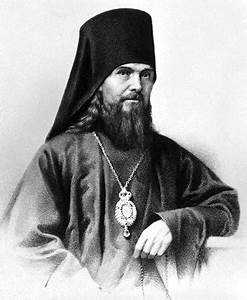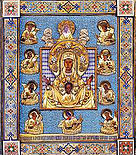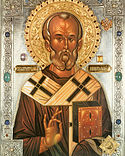St. Theophan the Recluse

On 10/23 January the Orthodox Church commemorates Saint Theophan the Recluse of Vysha, in the world Geoege Vasilievitch Govovrov, born on January 10th 1815 and reposed on the feast of Theophany in 1894. Together with Saint Ignaty (Brianchaninov) of Stavropol and the Caucuses, St. Theophan was one of the most important writers and thinkers of pre-revolutionary Russia, the spiritual father of many clergymen, monastics and laypeople, and had an enormous influence upon the spiritual life of his era. St. Theophan was from born in a family of the clergy, the son of a priest, and he studied in seminary and subsequently at the Kiev Spiritual Academy, where he made his monastic vows and began a career in the same sort of spiritual educational establishments. He taught psychology, which was just coming into its own as a separate field of study at the time, and Latin. St. Theophan must have had a great gift for languages; besides Latin, he knew ancient and modern Greek, passable Arabic and Hebrew. And was quite fluent in French, the language of diplomacy at the time. He was spoken of as a virtuous, very hard-working, quiet and meek person, fond of being alone. In 1847 he was appointed a member of the first Spiritual Mission to the Holy Land from Russia, led by the famous archeologist and scholar of early Christianity, Archimandrite Porfiry (Uspensky). The six years that St. Theophan spent in the Holy Land were of an enormous significance to his work as a scholar, and especially for his spiritual formation. He traveled all over Palestine. Visiting the ancient monasteries, absorbing monastic life at the very sites that had inspired it and where it began, collecting and studying ancient manuscripts of the writings of the holy fathers. especially at the libraries of the Lavra of St. Sabbas the Sanctified. St. Theodosius the Great. and of the Jerusalem Patriarchate. This labor was a sort of continuation of the labors of St. Paisius (Velichkovsky) one hundred years earlier, when he began tosearch for, collect and translate ancient patristic manuscripts on Mt. Athos. The publication of these new translations of the almost forgotten works of the holy Fathers became the spark that started up a genuine spiritual revival of spiritual life in Russia in the XIX and early XX centuries. St. Theophan’s time in the Holy Land came to an end with the beginning of the Crimean War. He took his time returning to Russia, visiting many European capitals. Exploring museums, universities and libraries. Soon after his return to Russia he was consecrated a bishop, and continued his scholarly work. His first books were published at this time, many of which became classics of Orthodox spiritual literature, familiar to all of: “Unseen Warfare”, “What is Spiritual Life and how one must Become Attuned to it”, “The Way to Salvation”, and above all, “The Philokalia”. At this time St. Theophan began to seek permission to retire. He gave poor health as his reason, but probably his sincere desire to dedicate himself to the sort of solitary, secluded ascetic labors, to the ancient forms of monastic life that he had studied and experienced while traveling in the Middle East, was an equally important reason. By God’s providence St. Theophan’s request was granted, he left his diocese, and became the only Bishop-Recluse of the Russian Orthodox Church, spending 22 years in seclusion. St. Theophan resided at the Vysha monastery of the Tambov diocese. For the first few years he participated in the monastery’s services, but subsequently shut himself away completely in his living quarters, where a chapel was constructed, and where he celebrated the Divine Liturgy daily. Along with his translations and scholarly work he kept up a huge correspondence, responding to 20-40 letters daily. His vast personal life and spiritual experience, his profound knowledge of theology, and his many years of prayerful struggle in solitude made him a wonderful spiritual guide. He taught and guided many monastics for many years, from the very beginning of their path up until they themselves began to lead others. St. Theophan had a revelation of and began to prepare for his repose several days before Theophany. The name “Theophan” is derived from the name of the feast of Theophany, and means “God appears to us”. And truly, God has appeared in and found a place in the lives of multitudes of Orthodox Christians all over the world through the translations and writings of the great Russian saint.

